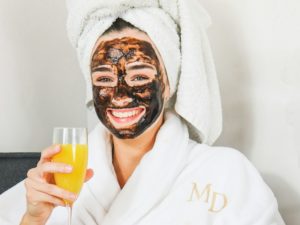Want Better Skin? 5 Simple Yet Overlooked Tips to Try
Skincare is self-care, and no matter who you are, you should be adding a skincare routine to your daily habits. Skincare not only improves the look of your skin but increases its health and supports the skin to enable it to do its job; protecting our insides from the outside world. What if you want even better skin with simple changes in your routine?

A routine that consists of SPF in the morning, cleansing, and moisturizer is all you need for better skin, as long as your sunscreen is applied as required, your cleanser is balanced, and your moisturizer is hydrating. If we want to step up our routine to the next level for better skin, we need to add a little bit more to our routine. Use these simple tips that are often overlooked to get better skin easily.
5 Simple Tips for Better Skin
These simple lifestyle changes or additions to your skincare routine will increase the look and health of your skin exponentially! Try them out and see how your skin improves today.
1. Eat a Variety
You know what they say, you want to have a rainbow on your plate. This means eating a variety of fruits and vegetables at almost every meal. A big variety of whole foods provide important health benefits as they are filled with vitamins, minerals, and antioxidants that can improve overall wellness, including skin health.
Plus, a large variety of fruits and vegetables is also highly beneficial for gut health. This variation increases the balance and nutrients of the microbiome. A healthy gut can contribute to healthy skin, as more and more studies have found that when the gut is unbalanced, skin conditions may worsen and become irritated.
2. Use Retinol at night
We all know what a science-based skincare routine looks like, as detailed here, and if you really want to improve the look and health of your skin, add retinol. Retinoids are a group of highly studied, science-backed skincare ingredients derived from vitamin A. Retinoids have amazing benefits, including increasing collagen in the skin, reducing fine lines and wrinkles, improving hyperpigmentation, decreasing acne, and softening the skin.
There are many types, including retinol (gentle variation), retinal (a bit stronger), and retinoic acid (stronger, prescription required). Use it at night as retinoids tend to break down when exposed to light, and be sure to start on a low dose and work your way up.
3. Reduce Added Sugar
Added sugars are a big cause of health concerns. The World Health Organization recommends that added sugars be about 50 grams of sugar per day (about 10 teaspoons) for an adult and even less for children. A 12-ounce can of coke has this amount. Added sugars are in everything, from salad dressings, to ‘healthy’ protein bars, to loaves of bread and drinks.
Added sugars are a main source of inflammation, heart disease, insulin resistance, and metabolic syndrome. It is important to cut out the products that contain added sugar and swap them. Instead, reach for whole fruits and vegetables, which as stated before, are rich in antioxidants, vitamins, and minerals, and are naturally sweet.
4. Add Vitamin C to Your Routine
Vitamin C is another one of those highly studied skincare ingredients that are sure to give you better skin. Vitamin C in skincare is a topical antioxidant used during the day that will protect the skin from free radicals. When free radicals build up in the body, they can cause damage to the DNA, proteins, and cells, which increases aging and the risk of disease.
The vitamin C type that is the most studied is L-ascorbic acid, which is the purest form of topical vitamin C, but also the least stable. Other good options include magnesium ascorbyl phosphate, sodium ascorbyl phosphate, 3-O-ethyl-L-ascorbic acid, and ascorbyl glucoside. They are less irritating and more stable, though less effective than the purest vitamin C form.
5. Simplify your Skincare
For better skin almost instantly, you may want to simply simplify. Using too many active ingredients can cause more damage to the skin barrier. Active ingredients include things like retinoids, vitamin c, exfoliating ingredients like lactic acid, etc. Too many actives at once can irritate the skin, causing flakiness, redness, and pain. This is especially true if you mix certain skincare ingredients that should not be mixed.
For example, if you use a retinoid, you want to avoid other exfoliating ingredients. Vitamin C and retinoid can be used on the same day, but use vitamin C in the morning and the retinoid at night.
A simple skincare routine consists of day and nighttime habits. It is optional to cleanse in the morning, but make sure to moisturize and use SPF. At night, use a pH-balanced cleanser, double-cleanse if needed, and moisturize. After going back to the basics, you can slowly add in other active ingredients one at a time, allowing the skin to get used to them before increasing concentration or adding a different one.
The Takeaway
Skincare is self-care and a must for anyone that has skin. If you want the basics, all you need is simply routine, which may actually improve skin health. Trying out too many active ingredients may disrupt the skin barrier and cause more harm than good.
Aside from a simple routine, you want to add some science-backed skincare ingredients into your routine. This includes ingredients like retinoids and vitamin C. They are highly studied and should give you the results you desire. Using them can provide you with better skin that is healthy and pretty, easily.
Some lifestyle changes like reducing added sugar and eating many different fruits and vegetables can also help you get better skin.
Health starts from within, therefore it is vital to eat a variety of nutrient-dense foods, hydrate properly, work out daily, and take care of mental health. With the right building blocks, wellness will flourish. Fitness is about the daily habits you do that help you thrive. Take care of your mental health, treat yourself, and practice skincare on the entire body, not just the face.
Remember gut health too! Many skin issues may be due to an unbalanced gut which certain foods or a lack of variety in your diet can cause. With a balanced gut microbiome, you can improve strength, mental health, immune system response, digestion, metabolism, and much more. Learn everything you need to know about gut microbiota today for free here!





